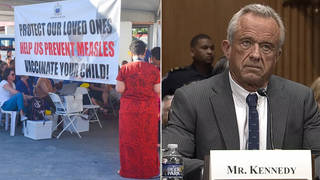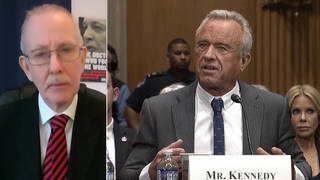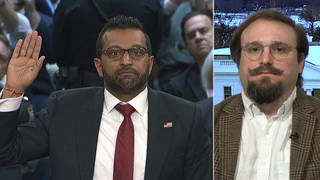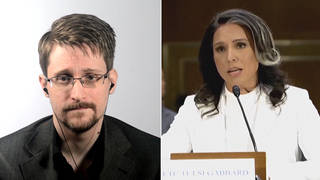HeadlinesJanuary 06, 2020
Iraqi Parliament Votes to Oust U.S. Military; Trump Threatens Sanctions
Global tensions are mounting following the United States’ assassination of Iranian commander Qassem Soleimani in a drone strike at the Baghdad International Airport Friday morning. Up to a million mourners poured into the streets of Iran and Iraq for the funeral procession of the longtime leader of the Islamic Revolutionary Guard Corps’ Quds Force. In response to the assassination, the Iraqi Parliament voted Sunday to expel all U.S. military forces from Iraq. President Trump responded by threatening to impose sanctions on Iraq “like they’ve never seen before.” Iraq has already been the target of some of the harshest sanctions the world has even seen. U.S.-backed sanctions killed more than a million Iraqis, including over 500,000 children, between 1990 and 2003. Trump has also threatened to target 52 locations in Iran, including cultural sites, if Iran retaliates against the U.S. The targeting of cultural sites is widely viewed as a war crime. Trump said the number 52 was for Iran’s taking of 52 hostages 40 years ago. The Pentagon says it’s sending nearly 3,000 more troops to the Middle East from the 82nd Airborne Division. Iran says it’s pulling out of the 2015 nuclear deal. The United States has already pulled out of the nuclear deal. Many Iraqi residents say they are concerned the rising tensions between the U.S. and Iran will engulf Iraq. This is Baghdad resident Naji Khathem.
Naji Khathem: “It is a horrific atmosphere. They want us to live in chaos, worse than what we live in now. There will be more killings, and the fight between the U.S. and Iran will move to Iraq. They don’t care that we are protesting for our rights. What is coming will be worse.”
Vermont Senator Bernie Sanders and California Congressmember Ro Khanna have introduced new legislation that would block funding for any military action “in or against Iran” without congressional authorization. House Speaker Nancy Pelosi says the House will vote this week on a war powers resolution to limit Trump’s military actions. Meanwhile, the Council on American-Islamic Relations says more than 60 Iranians and Iranian Americans were stopped and held for hours of questioning at the U.S.-Canada border over the weekend as they were trying to return to the United States, many after attending a concert in Vancouver. Advocates say some were denied entry into the U.S.
In Dozens of U.S. Cities, Protesters Say No War with Iran
Protesters took to the streets across the United States on Saturday to condemn the killing of Qassem Soleimani and protest against a U.S. war with Iran. The protests were organized by the groups CodePink and ANSWER — that’s Act Now to Stop War and End Racism. From coast to coast, crowds gathered in Washington, D.C., Seattle, Chicago, Denver, Philadelphia, San Francisco and here in New York City. This is Rachel Hu.
Rachel Hu: “It’s very serious. When we talk about war, we can’t ignore the reality of how many lives have been lost in Iraq and Iran. And we’re not talking about U.S. soldiers which have died also in the fighting; we’re talking about all of the people on the ground who are dying. … And so we can’t forget that, that fundamentally all of these things are not only acts of war, but there are serious consequences and carnage for it.”
Elizabeth Warren Accuses Trump of Killing Soleimani to Distract from Impeachment
President Trump’s decision to sharply escalate hostilities with Iran comes as President Trump’s impeachment process is expected to heat back up this week now that Congress has returned from its winter recess. The Democratic-controlled House and the Republican-controlled Senate remain in a standoff over the impeachment, with House Speaker Nancy Pelosi refusing to send the articles of impeachment to the Senate in efforts to pressure the Senate to call witnesses in the trial, among other procedural demands. Senate Majority Leader Mitch McConnell has said he will not call witnesses and that he will coordinate Trump’s trial with the White House.
On Sunday, Massachusetts Democratic Senator and presidential candidate Elizabeth Warren suggested that President Trump had chosen to kill Iranian commander Qassem Soleimani in order to distract the American public from the impeachment proceedings. This is Warren speaking on NBC’s “Meet the Press.”
Sen. Elizabeth Warren: “We know that Donald Trump was very upset about this upcoming impeachment trial. But look what he’s doing now: He is taking us to the edge of war.”
Al-Shabab Kills U.S. Soldier and 2 U.S. Contractors in Attack in Kenya
In Kenya, al-Shabab militants killed an American soldier and two military contractors in an attack on a Kenyan military base Sunday. The attack on the Manda Bay Airfield was al-Shabab’s first attack against U.S. forces in Kenya. This comes after an al-Shabab attack in the Somali capital Mogadishu killed 79 people just over one week ago.
17 Killed, Dozens Wounded in Airstrike in Tripoli, Libya
In Libya, at least 17 people were killed and dozens more wounded in an airstrike on a military academy in the capital, Tripoli, Saturday. The Health Ministry of the Tripoli-based government said most of the victims were students. Libya’s capital has been the site of months of fighting between the so-called Libyan National Army and the United Nations-backed government that controls the capital.
14 Killed, including 7 Children, in IED Attack in Burkina Faso
In Burkina Faso, at least 14 people were killed and a dozen more wounded when a bus carrying students ran over an improvised explosive device Saturday. At least seven of those killed were children. No group has taken responsibility for the blast in northern Burkina Faso, near the border with Mali, where militants have launched increasingly deadly attacks against civilians this year.
Australia Deploys Military as Unprecedented Wildfires Rage
Australian officials have launched the largest peacetime maritime rescue operation in the country’s history in order to rescue thousands of residents and tourists stranded on the beach after being forced to flee uncontrollable wildfires. The unprecedented climate-fueled wildfire season has forced Australia to deploy troops and military resources in a way not seen since World War II. This is New South Wales premier Gladys Berejiklian.
Gladys Berejiklian: “The extent of this bushfire season, in living memory, and many experts have been around much longer than I have, who have fought fires and observed circumstances, all agree: We are in uncharted territory.”
The wildfires have killed at least 24 people, scorched an area larger than Switzerland and killed half a billion animals. The fire season is expected to continue for at least a month.
Death Toll in Jakarta Flooding & Landslides Rises to 53
In more climate news, in Indonesia, the death toll has risen to 53 people killed in the flooding and landslides sparked by historic rainfall on New Year’s Eve in the capital Jakarta. The torrential downpour submerged part of the capital. The flooding is the worst to hit Jakarta in over a decade. Indonesia is moving its capital from Jakarta to East Kalimantan because over a quarter of the city will be under water within the next 10 years.
Masked Men Attack Students at Jawaharlal Nehru University in India
In India, students across the country have taken to the streets to protest after masked men attacked students at Delhi’s Jawaharlal Nehru University Sunday. At least 40 students and professors were hospitalized with injuries after Sunday’s attack. The injured students have blamed the attack on a right-wing student group linked to Prime Minister Narendra Modi’s ruling BJP party. In response to the attack, protests are being staged or organized in a slew of cities across India, including in Mumbai, Delhi, Hyderabad, Chennai and Bangalore.
36 Killed in Collapse of Hotel Under Construction in Cambodia
In Cambodia, at least 36 people were killed when a hotel under construction collapsed, trapping workers and their family members inside. Among those killed were six children. Cambodia is currently undergoing a tourism-fueled construction boom, but the industry has little regulatory oversight.
Maduro Takes Control of Venezuela’s National Assembly
In Venezuela, President Nicolás Maduro moved to take control over the National Assembly and blocked the re-election of opposition leader Juan Guaidó as the assembly’s leader. The move comes as Maduro seeks to hold onto power amid a U.S.-backed opposition movement. He has faced criticism for consolidating control over Venezuela’s various governmental institutions, and his critics denounced the move as a “parliamentary coup d’état.”
Rick Perry Rejoins Pipeline Company Energy Transfer’s Board of Directors
Former U.S. Energy Secretary Rick Perry has rejoined the board of the company that oversees Energy Transfer Partners, one of the biggest pipeline operators in the United States. The company, owned by billionaire Kelcy Warren, is best known for its Dakota Access crude oil pipeline, the construction of which drew months of massive resistance led by the Standing Rock Sioux and other Native American nations. Perry had previously served as a director of Energy Transfer Partners before stepping down in 2016 as the corporation faced backlash over the Dakota Access pipeline.
New Cambridge Analytica Leaks to Expose Election Manipulation in 68 Countries
The Guardian reports a new massive leak by data firm Cambridge Analytica is set to expose tens of thousands of documents detailing the work of a global operation involving at least 68 countries used to manipulate voters on “an industrial scale.” The documents will be released over the next months. Cambridge Analytica was founded by billionaire Robert Mercer. Trump’s former adviser Steve Bannon of Breitbart News was one of the company’s key strategists. The company collapsed in May 2018 after The Observer newspaper revealed the company had harvested some 87 million Facebook profiles without the users’ knowledge or consent. Cambridge Analytica then used the data to sway voters to support President Trump during the 2016 campaign. The most recent leak began on New Year’s Day through an anonymous Twitter account with links to documents on elections in Brazil, Malaysia and Kenya.
Boeing Discovers Another Flaw in Troubled 737 MAX Jets
The New York Times reports Boeing has discovered yet another massive flaw with its troubled 737 MAX jets. A December audit of the plane’s safety, ordered by the Federal Aviation Administration, or the FAA, found previously unreported concerns with the wiring in 737 MAX airplanes, which could potentially cause a short circuit and a crash if pilots did not respond adequately. Last month, Boeing CEO Dennis Muilenburg was fired just weeks after the corporation halted production of the jet, following outrage over two crashes in Ethiopia and Indonesia that killed all 346 people on board.
Accused Rapist Harvey Weinstein’s Trial Begins in Manhattan Today
In New York City, the trial against disgraced Hollywood mogul and accused sexual predator Harvey Weinstein begins today in a Manhattan court. He faces life in prison. The trial comes more than two years after initial accusations against the film producer were published in The New Yorker and The New York Times, fueling the #MeToo movement that swept Hollywood and beyond. Since then, over 100 women have accused Weinstein of rape, sexual assault and sexual harassment. Weinstein faces five felonies based on accusations by two women. Last year, he pleaded not guilty to multiple charges of rape, sexual assault and “predatory sexual assault.”
Most popular
- 1
- 2
- 3
- 4
Non-commercial news needs your support
Please do your part today.











Media Options